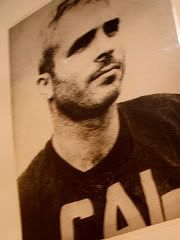From this bit in the NYRB, one gathers why Rove, et. al., went after McCain's service ("traitor", etc.) and raised questions about his "hidden [black] children"...
[McCain's Vietnam story] a staggering story, told most grippingly, in my reading, by David Foster Wallace.
It is also just the right tale of heroism for an unwanted war. If McCain had shot down the greatest number of North Vietnamese, who would celebrate him? If he had led a great raid, most people would be indifferent to him, or—worse—Seymour Hersh or some other investigative journalist would likely have found out by now that innocent women and children were slaughtered. It was by suffering in a cell, serving as a kind of metaphor for American suffering in a war most Americans gave up on early in his confinement, but at the same time holding fast to principle under the most unimaginable circumstances, thereby redeeming some notion of American honor in a dishonorable situation, that McCain became an American hero. Liberal opponents of the war, who seldom acknowledged the repressive brutality of the North Vietnamese regime, were put on the defensive by the story of how he was tortured.
The tale has had a particularly talismanic effect on Baby Boomer journalists, many of whom probably opposed the war when they were young, or did not serve, or both, and thus reflexively grant McCain great moral authority.
There is also a sample, boilerplate interview with McCain, which just struck me, because it was so obviously written before McCain pulled out his I-served-and-you-didn't line this past week, which now looks like a stock manoeuvre.
There is more in the article. It focuses on three lines of critique. 1. Temper 2. Policy Record 3. a "reinvented" candidate/nominee unlike "McCain".
From the footnotes, a new chapter on how the corporate press amplifies the McCain myth.





